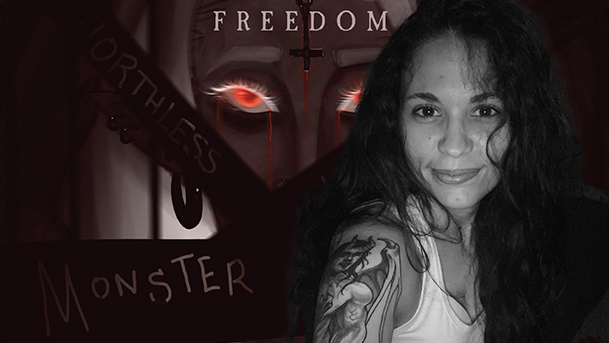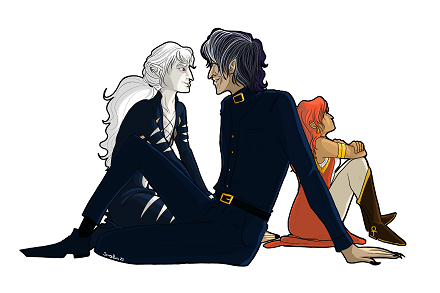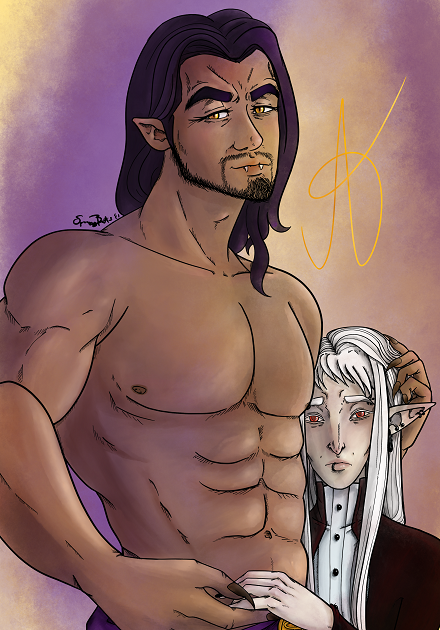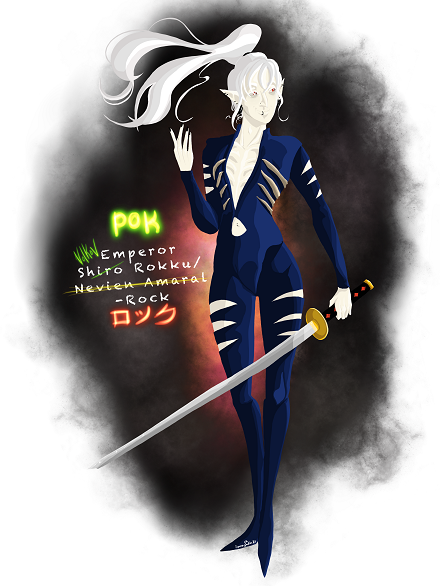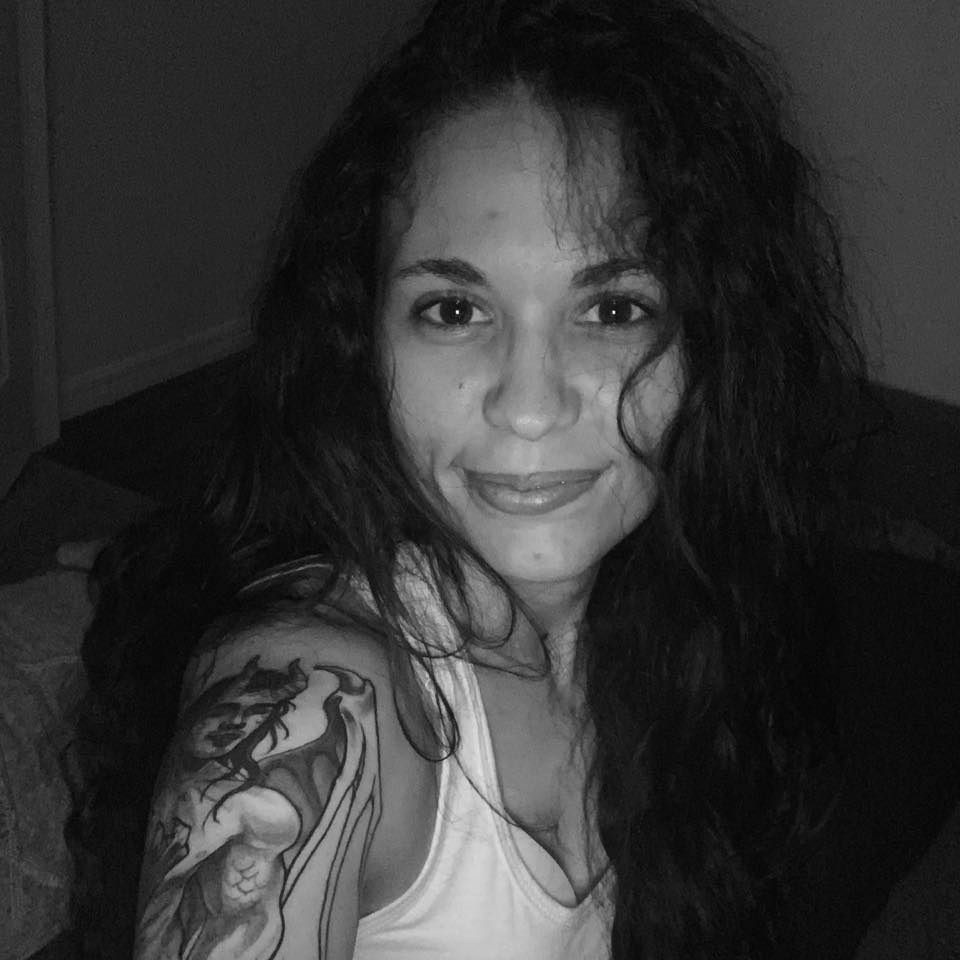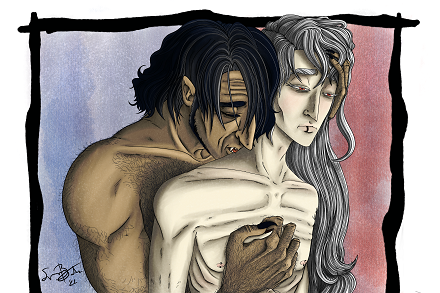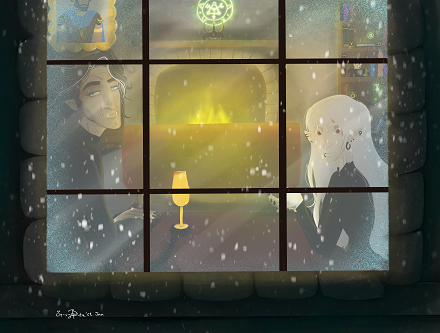Recently, Tellest had the opportunity to promote the work of a debut fantasy storyteller in Stephany Barcomb-Rodriguez. Her title, The Last Sane Awoken, is a magical fantasy from a bit of a more interesting, darker perspective, and it was a lot of fun to dive into. Today we learn a bit more about the story, and a lot more about the author. Read on to learn more about Stephany Barcomb-Rodriguez.
Tellest: Hello Stephany! First, I’d like to congratulate you for bringing your book into the world. I know that you’ve been working on it for a long time, so to see it on shelves both virtual and physical must be incredibly exciting. I’d also like to thank you for taking some time to talk to me about the worlds you’re building. You’re already putting together sequels and a separate series, so being able to get even a few minutes to talk to you feels like a wonderful opportunity.
Stephany Barcomb-Rodriguez: Thank you! I’m happy to have this opportunity to talk about the first book with you!
T: One of the first things I try to find out about my interviewees is what helped to shape the writer they are. I want to know about what their inspirations were, whether they were a specific person, a member of their family or friend group, or some other medium. What can you tell me about your inspirations?
SBR: For me, I was that quiet kid who behaved extraordinarily well around authority. I grew up in a very toxic and abusive environment. By the time I was in high school, I loved to draw, write, and read, but finding the right book was always a challenge for me. I couldn’t relate to most of the characters, the story was too ‘surface-level’, or the stories sounded too the ‘same’. Raw and real was mostly censored out, until I read ‘Speak’ and ‘Child Called It’. From then on, I wanted to write a series young, teenage me would have wanted to feel a little more understood.
T: First off, I want to say that I hope that you’re doing better, and in an environment that is less stressful. With that mentioned, however, there is the notion of “the tortured artist” in some ways, and that could tie into rough emotions, and perhaps the idea that we have a broken sanctuary. Do you ever find your storytelling affected differently by the lack of that toxic environment?
SBR: Before anything, I do want to say I have some peace since my worse days. I’ve managed to get through grad school, break out of poverty, and had the strength to go no contact with some family, while reconnecting with others. For the longest time, I thought I was doomed to be unhappy and trapped in the vicious cycle, but somehow, at some point, I saw the light. Shy, meek me became outspoken. I want others who grow up in abusive homes to see there is a way out in time. I just hate that we have to suffer through it during our childhoods and teenage years due to dependence and/or manipulation.
I feel affected when we ignore or deny these sorts of lives exist for people. Even those in denial may ignore it. Admittedly, yes, the toxic environment is a ‘broken sanctuary’ when in a story but knowing this is overall fiction brings relief. It forces me to think about what it’s like to be in another’s shoes in a raw, real way, but I’m physically safe from it all, simply reading the experiences of these characters. There’s an odd comfort when you can feel understood, or reminisce in the pain, but choose to break out of the world when it’s too much. It constantly reminds me to be empathetic and that imperfection is normal.
I also feel like the “tortured artist” is capable of capturing the true pain others feel, open to the endless possibilities of both good and bad experiences someone can go through. I do think it is important to find the right balance of sanity when writing these sorts of books. While everyone experiences trauma, a very small handful experience something many would identify as ‘extreme’. Their perception of life is tainted and skewed. Characters with a much more stable mind exhibit the audience who is a mere witness, trying to understand the pain they may have never experienced. The ones in the audience suffering can identify with the victim(s) but see how others do truly care about them, but these kind strangers, friends, family, and trusted people don’t always know how to help.
T: When you and I were talking behind the scenes, you mentioned that you suffered from dyslexia. Yet you’ve created this expansive world, with more yet to come, and it looks like it comes so easy to you. What sort of challenges have you experienced putting all this together with that in mind?
SBR: My mind is much faster than my fingers. I forget words, make weird sentences, write odd paragraphs from time to time. I’m constantly reading and hearing the words to help me fix mistakes. I have a lot I want to put out there, and I can write super quick, but does it always make sense?
So, having some family and friends be my alpha readers at the super early stage helped catch and correct many of those odd mistakes so all I had left was more grammar focused issues. It does make for a good laugh now and then when rereading, some mistakes have even become inside jokes between my sister and I. Gotta laugh at your mistakes, get the support you need where you lack, and push forward.
T: One other way that has historically been great for authors to push past any sort of comprehension issues is reading aloud. Nowadays, it’s getting easier to turn that narration into a file for an audiobook. Have you ever thought about using your voice to create another version of your book, and one more way to connect with your audience?
SBR: Absolutely! I always wanted an audiobook and have looked into it. And I know we all listen and understand at different rates, but for me I need the reader to go slower and add the emotion. There are so many accents and culture within the characters, there is no way I could ever bring that to life myself without feeling disrespectful. I’d love to find a wonderful voice actor who can make audiobooks to make it just right. It’s the next big step I want to do for the book, but it’s all about budget and finding the right voice!
T: You and I sort of touched on this in the info I sent your way earlier in our “behind the scenes” material, but Amazon’s ACX could put you in touch with some hungry audio producers, and if my memory serves, you can even set it up so that you share royalties instead of having the cost be up front.
Since that’s more of a statement than a question, let’s find a way to loop it back around.
What sort of celebrity voice would you want your audio producer to have?
SBR: Sharing royalties sounds amazing! They would have to have faith in my book, but maybe that is an option for me!
I just want someone passionate, but a soft, male voice is what I envision due to the main protagonist. Many of the characters range from ‘Spanish’, ‘Romanian’, ‘Russian’, ‘Scottish’, etc accents where their culture is loosely based off of. I do hope it doesn’t come off offensive, but to me it provides a much richer world. There’s more variety and I want to hear it in the audiobook to bring the audience into the world just as I envision it.
T: A large part of your book can be seen as the emotions and psychological look at your characters. It’s not just action sequence after action sequence. Were there any challenges to developing a story that has that sort of raw look behind veil of your cast of characters?
SBR: Yes! This was very challenging. I took such care to make sure the story and characters balanced each other. This is the introduction to the series, so the action will pick up as time moves on, but there is still a huge emphasis on the mental well-being of the characters. Characters tell me how they feel or who they are over time with writing, and from there I try to make them behave like real people and all their imperfections. Every day of someone’s life is not usually action, action, and more action. There are ups and down and I wanted to capture the normalcy of it. It really contrasts to moments where abusive situations take place and often makes it jarring how anger or abuse escalates.
T: You mentioned that your characters tell you how they feel or who they are, but there’s more to the story than the people. When it comes to unearthing the story, is it something that you’re discovering along the way, or are you helping to speak it into existence?
SBR: So, I have a general idea of what I want, but I usually don’t even have an outline. As the story develops the details from A-to-Z form in the moment. Many times, I’ll think of random scenes from listening to music, watching a movie, playing a game, and even from dreams! I use these scenes as my guideline and then naturally fill in stuff until the scene makes sense. I feel as if we were to make a compelling story that felt somewhat random, like real life, I simply can’t plan it. It’s a strange experience, almost like when I write I’m lost in another world, or I don’t exist anymore. I’m watching in anticipation with the characters while my brain runs amok making details or situations for the characters to react to.
T: What do you do in a situation where you have a writing block? Do you end up diving into your music, or find writing prompts, or do you have another process?
SBR: Most of the time I’ll stop writing, sometimes I can push through, but if it’s a tough writer’s block, nah. Sometimes, I won’t write for a month or two and enjoy other hobbies. I want the story to come natural and I cannot do that if I must force it out of my brain. Most writing prompts don’t interest me, but inspiration comes from the most random places. Sometimes having a conversation with someone can spark an idea just from a mere, obscure sentence that has absolutely nothing to do with my story.
T: Because you write your stories from what feels like an emotional place, you can feel the poetry that comes off the page in places. Is that something that comes naturally, or do you have to dive into it, and feel the cadence whenever you’re bringing it to life?
SBR: When a reader dives in, I want them to just get lost in the story. I’m no poet or fancy writer. I’m often intimidated by those who have a better way with words, but I simply want to tell a story. When you read, you should feel heavy emotions, empathize, cringe, feel uncomfortable, relieved, and everything in between. I did worry something like this could be boring, but there is a lingering dread through the story that keeps the pace moving when action is absent.
T: There is a bit of darkness to your stories, for sure. How did it feel writing heroic characters who are sort of enmeshed with these “less than heroic” backstories? Were there any shifts that you had to make in your head to figure everything out?
SBR: For me, the beauty of stories is character development. Many times, everyday people have to step up and become a hero for their small world.
But I worried about the main character being portrayed as I wanted. He’s unconventional in many ways, barely even viewed as a male anywhere he goes. There’s a clear sense of insecurity and words stained in his brain that drives him to be mildly complacent, but there’s a fire that never lets him fully succumb. Most look at him and classify him as weak, but there’s more to a person than their muscle, gender, and personality. The main character is well aware of how he is perceived and doubts his abilities to be the hero for those who need him, especially after realizing the hope others had in him before he chose his destiny.
Even those we see as physically or mentally weak are worth the same as everyone else, and they can also be the hero everyone needs. There are no prerequisites to heroism, and I want people to know that no matter what unpredictable circumstances were thrown at you, anyone can rise up and reconquer their life with a heart to help others.
T: When you started on your story, did you know that you would have an unconventional hero at the helm? Or was it a situation where the story sort of needed things from that perspective, and they ended up being shaped by the story’s need?
SBR: Yes, I did, which is what took me so long to even try to write the book. I had so much fear as a teen and young adult that I would be deemed weird or just not ‘right in the head’, but I don’t really care about that now. The hero is a character I have been developing since I was fifteen. I don’t wanna date myself too much, but it’s been over fifteen years. He’s been my ‘baby’ for so long, I have to give him the time to shine. Let him have his story. I’m the only one that can make it happen, so I’ll continue to push to make this happen. I owe it to him and young me to not be afraid of being ‘a little different’.
T: You’re not just the writer for The Last Sane Awoken. You also illustrate for it. What is your experience with being able to bring your characters to life in those different mediums? Do you see them in your head the same way that you illustrate them?
SBR: This has been the most amazing part of this journey. I never thought I would ever like my work enough to use it as the art for any project, but I realized we grow and learn over time and there’s no shame showcasing where I am now with my artistic experience. The iPad Pro and Procreate is my way of creating all my digital work. The characters are drawn in my unique style with a strong resemblance to the character’s true look, style, and culture.
T: And your art doesn’t necessarily stop at traditional art either. You’re working on pixel art every now and then for what looks like a video game tie-in. Could you see yourself making an entire series based off of your work?
SBR: My original dream a few years ago was to make this series a video game. My experience was a bit limited and often got discouraged in the process. Many of the ideas for the story came during this time, putting together pieces of universes I wrote alone or with others to inspire me and make this dense, diverse world. I settled on writing the story for the game first and realized it was time to write the book.
T: It’s not just any author who goes to think about turning their work into a game. You’ve got some history with computers and technology, however, and sometimes that brings people close enough to the game development know-how needed to at the very least start drawing up some concepts. But because you work with technology, there can be some drawbacks too. Does it ever get overwhelming enough that you don’t want to look at a computer again for the rest of the weekend when you’re done with your workday?
SBR: Oh my gosh, yes. Sometimes, it is too much. I say I have too many hobbies and balancing them all is my biggest challenge. There are days I only draw on my iPad and my computer stays off. There are days I don’t even want to look at a screen after working, writing, drawing, and/or gaming, so I’ll sew with my sister or go on walks or go to the beach. It’s all about balance, but much easier said than done.
T: Your world is rich and deep. You can tell that it wasn’t something that was just developed as an afterthought. There’s lore and culture abound. How challenging was it to take a fantasy world and turn it on its head and add a layer of freshness that seems to be missing in a lot of stories these days?
SBR: The vast world was inspired after playing Dragon Age Inquisition. In Dragon Age, much of the character’s accents are based on the French language and culture but in a fantasy setting. It engulfed me and made it feel like it had a bit of our world in there to make it more relatable. As I developed my characters, their ethnicity, accents, backstories, countries, kingdoms, etc. were loosely based on culture we have in our world today.
Fantasy seems like a tough place to vary, but I think it’s not that difficult to make something different if you’re not afraid of your world. I fully expect to get some form of hate for the book, but I’m okay with that. I prefer to build a unique world that materializes in my mind than backpaddle and take a safe route. Look at Montero from Lil Nas X. His style of music is vast, but he had his own spin on it and wasn’t afraid to let himself shine. That confidence drew me in and inspired me to push forward, no matter how weird or alienated I felt writing what I just wanted to write about!
T: And because of those variations, you have a lot of opportunities to make it feel as though your characters are represented and seen in a bunch of ways. Did you ever hesitate to add a character into your story, or were you confident in all your decisions, and convinced from the get-go to be bold?
SBR: At the beginning, I did hesitate to add many pieces or characters. There were even some scenes I wanted to tone down to not scare anyone, and then I realized, I’m not writing for others. I’m writing a story that is unfolding before me and it would be a disservice to let doubt and fear get in the way. People trapped in these situations wish life could be different or that life was not as cruel, but reality is reality. We don’t get to pick and choose every aspect of our lives, but we can choose how we overcome the hurdles.
T: Thank you very much for spending some time with me Stephany. It was great getting to learn more about you and your world, and all the projects that you are working on. If someone wanted to learn more about you, where could they go on the internet to do so?
SBR: Thank you so much! It was an absolute pleasure to answer all your questions. I have a growing author’s page through Amazon, my LinkedIn, and my Instagram where anyone could catch up with my current endeavors. Instagram is much more relaxed as I use the platform to just post drawings and can be more personal. My author page and LinkedIn are much more professional! 😊
Instagram: https://www.instagram.com/spoopy.bats/
LinkedIn: https://www.linkedin.com/in/stephany-barcomb-rodriguez-a91636119/
Amazon Author Page: https://www.amazon.com/Stephany-Barcomb-Rodriguez/e/B09Z6VX2CJ
As always, I am open to feedback and look forward to see what people think! Thank you for having me!
Once again, I’d like to thank Stephany for joining us to talk about her books and her hobbies and what generally makes her tick. She’s been at work for a while on this debut, and it shines in a lot of ways because of that time spent refining and bringing her characters to life. If you’re interested in her work, check out Barcomb-Rodriguez’s wonderful dark fantasy, The Last Sane Awoken I: Freedom on Amazon today!
Michael DeAngelo
Latest posts by Michael DeAngelo (see all)
- Fantasy Promo – Quinine - July 25, 2024
- Sigil Art – Grim’s Hold - July 24, 2024
- Fantasy Promo – Light the Shadows (Under Elfhame’s Stars) - July 24, 2024
